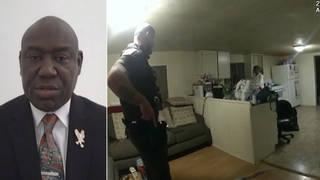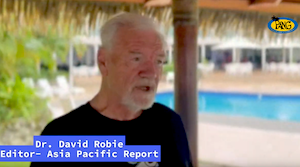The Las Vegas Metropolitan Police Department refused on July 10, 2024, to include a freelance journalist and a local video news outlet that relies on stringers on its email list for notifications of press conferences.
Doug Roberts, a freelance video journalist for Las Vegas Live, told the U.S. Press Freedom Tracker that he has been trying for two years to get on the email list and has been barred from attending three press conferences.
The email list is primarily used to alert journalists about news briefings on developing crime stories, often held near the crime scenes, Roberts explained to the Tracker. He has missed some events, he said, but has been getting by with help from other journalists who share the information with him. Some have even taken his camera into the news conferences when he has been barred from entering.
“We’ve basically been getting by without being added to that list just because of the relationships that we’ve built with other people in the industry,” Roberts said. “Luckily they’re seeing us little guys being discriminated against so they’re helping us.”
In one instance, which Roberts recorded on a body cam and shared with the Tracker, a police public information officer denied him access to a June 26, 2024, press conference on the sidewalk. When he said it was a public space, she moved the press conference inside the police tape, excluding him.
Roberts wrote police a letter on June 27 seeking inclusion on the email distribution list, explaining that he is affiliated with both Las Vegas Live and OnScene.tv, a video distribution company. He wrote his request on letterhead from Live Core Productions, the company that he created for his freelance work. He sought inclusion on the list for Las Vegas Live, OnScene.tv and Live Core Productions.
In a response written by a lawyer for the department on July 10, Las Vegas police denied Roberts’ request, citing a Nevada statute that says criminal history information must be provided to “any reporter or editorial employee who is employed or affiliated with a newspaper, press association or commercially operated, federally licensed radio or television station.”
The letter stated that Roberts’ Live Core was not “a ‘press association’ or any other type of news media.” It didn’t address Las Vegas Live or OnScene.tv, but police didn’t add them to the list.
In the letter, the police argued that a press association had a limited definition, such as The Associated Press, which is a worldwide news cooperative.
“As such, LVMPD may not disseminate criminal history information to Live Core therefore and must exclude Live Core from media briefings,” the letter said.
The police department’s public information office didn’t respond to the Tracker’s repeated phone calls and emails requesting comment.
The Reporters Committee for the Freedom of the Press wrote a letter to the police department on behalf of freelance reporters on July 22.
“The protections of the First Amendment apply equally to traditional and non-traditional journalists and news organizations, including freelance reporters and stringers,” the letter said.
It pointed out that the Nevada Supreme Court, in interpreting the state’s reporter shield law, “clarified that courts ‘are not required to make a fortress out of the dictionary,’ and explained that these protections extend to journalists, including bloggers.”
Roberts filed a Freedom of Information Act request with the police department and received the email distribution list in redacted form. It includes more than 100 email addresses, some for online-only publications, such as tabloid entertainment news TMZ.
Roberts said that his exclusion from the email list and briefings has a chilling effect, because other journalists see that police could restrict access to them, too.
“I think that the media in Las Vegas is not being critical of the police, or they’re not doing their job in terms of holding the police accountable because they become reliant upon the police for information and for leads and for stories,” Roberts told the Tracker. “And if they become critical of police, they might end up in the same boat that we are.”
This content originally appeared on U.S. Press Freedom Tracker: Incident Database and was authored by U.S. Press Freedom Tracker: Incident Database.
This post was originally published on Radio Free.



 #BlackLivesMatter (@AamerAnwar)
#BlackLivesMatter (@AamerAnwar) 

 m a r c u s (@marcusjdl)
m a r c u s (@marcusjdl) 




![BD-TWO-pic.JPEG Two auto rickshaws are seen on an otherwise empty road during a nationwide curfew in the Jatrabari area in Bangladesh's capital, Dhaka, July 22, 2024. [Jibon Ahmed/BenarNews]](https://www.rfa.org/english/news/bangladesh-curfew-calm-deadly-violence-07222024184227.html/bd-two-pic.jpeg/@@images/726acbae-86e5-42a5-a899-3e2fe4af3745.jpeg)




